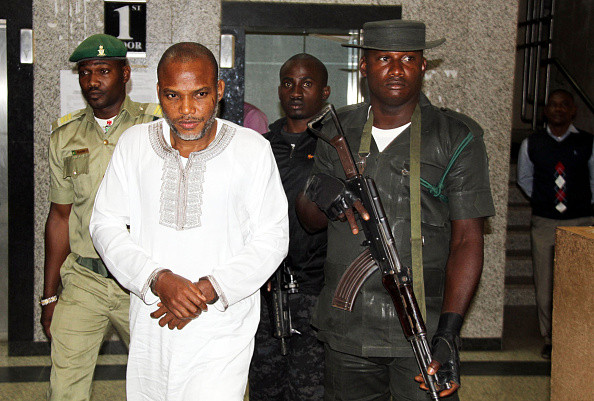Nnamdi Kanu trial: What next for Ipob leader's case after second judge steps down?
IBTimes UK looks at the various setbacks Kanu's trial has suffered since December 2015.
The high profile trial of Nnamdi Kanu – leader of a separatist movement that calls for the breakaway of Nigeria's contested Biafran territories – has suffered another setback when the judge presiding over the case stepped down on 26 September.
Kanu is the leader of the Indigenous People of Biafra (Ipob) and director of Radio Biafra. Pro-Biafrans call for the independence of Biafran territories, forcibly annexed to modern-day Nigeria during British colonisation, which ended in 1960.
Kanu and his co-defendants Benjamin Madubugwu and David Nwauwisiare are standing trial against treasonable felony charges.
However, both the prosecution and the defence have not been able to proceed with the case due to several obstacles – that Kanu's supporters have deemed as tactical, in order to keep their leader in detention for an indefinite time.
Tsoho is the second judge to have withdrawn from the case, which has attracted international attention. It is unclear how long the process to appoint a new judge will take. However, some lawyers have pointed out that judges are reluctant to take cases that colleagues have withdrawn from "because it would appear as if judges are passing buck."
Kanu, who denies all the charges against him, was arrested in Lagos last October on conspiracy and terrorism charges, which were later dropped.
The Abuja High Court initially ruled in favour of granting bail to Kanu. However, in December 2015, President Muhammadu Buhari said the Ipob leader would not be released amid fears he could jump bail and flee to the UK, as he holds both a British and a Nigerian passport.
IBTimes UK's exclusive interview with Kanu's wife
My husband must know we are fighting worldwide for his release
Nnamdi Kanu is not renouncing Biafra
'My husband is a prisoner of conscience'
As Kanu's case is on hold until a new judge is appointed, IBTimes UK looks at the various setbacks the trial has suffered since December 2015.
TIMELINE: Nnamdi Kanu trial and setbacks
December 2015
On 1 December, the trial is unexpectedly adjourned while Kanu's lawyers express fears for his client's safety. Kanu says he has no confidence in the court and alleges the government will not respect the outcome of the trial, which he deems as "needless".
As a result, Justice Ahmed Mohammed steps down. The case is assigned to Tsoho.
January 2016
A hearing set for 18 January to discuss Kanu's bail application put forward by his lawyers is adjourned to 20 January as Tsoho is absent in court.
Two days later, Tsoho rules Kanu should not longer be in DSS detention and orders he be sent to the Kuje prison. On 29 January, Tsoho denies bail to Kanu arguing he can leave the country.
February 2016
On 19 February, Tsoho rules against the possibility of conducting the trial secretly, as requested by the prosecution.

March 2016
On 7 March, one of Kanu's representatives, Chuks Muoma (SAN), says the prosecution is not ready to corroborate the charges against Kanu. He also asks for the charges against his clients to be dropped.
Tsoho ruled against Kanu's request to drop the charges and allows witnesses to testify behind protective screens. On 9 March, the defence opposes Tsoho's previous ruling that witnesses can testify behind screens.
May 2016
Kanu's defence argues against the decision of Justice John Tsoho to deny bail to their client. However, the Court of Appeal in Abuja upholds the high court's decision.
June 2016
Muoma claims a new lawyer has been introduced to represent Madubugwu. The trial is adjourned to 26 September to allow the new lawyer, Amobi Nzelo, to study the documents relating to the case.
September 2016
On 6 September, Judge Tsoho steps down and transfers the case back to the Chief Justice of the Abuja Federal High Court. The decision comes after Kanu and his legal team asked the National Judicial Council (NJC) to probe the judge over alleged "conflicting rulings".
Kanu's defence claimed Tsoho initially ruled in favour of the defence's application against the prosecution's request to protect witnesses. He was then believed to have ruled in favour of the prosecution, without seeking the permission of a higher court.
The Premium Times website reports Tshoho claimed he would not continue to preside over the case even if the NJC cleared him of any bias.
© Copyright IBTimes 2025. All rights reserved.




















